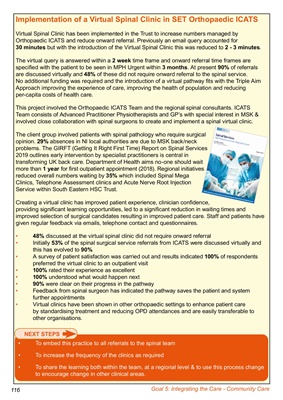
Implementation of a Virtual Spinal Clinic in SET Orthopaedic ICATS
Virtual Spinal Clinic has been implemented in the Trust to increase numbers managed by
Orthopaedic ICATS and reduce onward referral. Previously an email query accounted for
30 minutes but with the introduction of the Virtual Spinal Clinic this was reduced to 2 - 3 minutes.
The virtual query is answered within a 2 week time frame and onward referral time frames are
specified with the patient to be seen in MPH Urgent within 3 months. At present 90% of referrals
are discussed virtually and 48% of these did not require onward referral to the spinal service.
No additional funding was required and the introduction of a virtual pathway fits with the Triple Aim
Approach improving the experience of care, improving the health of population and reducing
per-capita costs of health care.
This project involved the Orthopaedic ICATS Team and the regional spinal consultants. ICATS
Team consists of Advanced Practitioner Physiotherapists and GP's with special interest in MSK &
involved close collaboration with spinal surgeons to create and implement a spinal virtual clinic.
The client group involved patients with spinal pathology who require surgical
opinion. 29% absences in NI local authorities are due to MSK back/neck
problems. The GIRFT (Getting It Right First Time) Report on Spinal Services
2019 outlines early intervention by specialist practitioners is central in
transforming UK back care. Department of Health aims no-one should wait
more than 1 year for first outpatient appointment (2018). Regional initiatives
reduced overall numbers waiting by 35% which included Spinal Mega
Clinics, Telephone Assessment clinics and Acute Nerve Root Injection
Service within South Eastern HSC Trust.
Creating a virtual clinic has improved patient experience, clinician confidence,
providing significant learning opportunities, led to a significant reduction in waiting times and
improved selection of surgical candidates resulting in improved patient care. Staff and patients have
given regular feedback via emails, telephone contact and questionnaires.
• 48% discussed at the virtual spinal clinic did not require onward referral
• Initially 53% of the spinal surgical service referrals from ICATS were discussed virtually and
this has evolved to 90%
• A survey of patient satisfaction was carried out and results indicated 100% of respondents
preferred the virtual clinic to an outpatient visit
• 100% rated their experience as excellent
• 100% understood what would happen next
• 90% were clear on their progress in the pathway
• Feedback from spinal surgeon has indicated the pathway saves the patient and system
further appointments
• Virtual clinics have been shown in other orthopaedic settings to enhance patient care
by standardising treatment and reducing OPD attendances and are easily transferable to
other organisations.
• To embed this practice to all referrals to the spinal team
• To increase the frequency of the clinics as required
• To share the learning both within the team, at a regional level & to use this process change
to encourage change in other clinical areas.
NEXT STEPS
116 Goal 5: Integrating the Care - Community Care